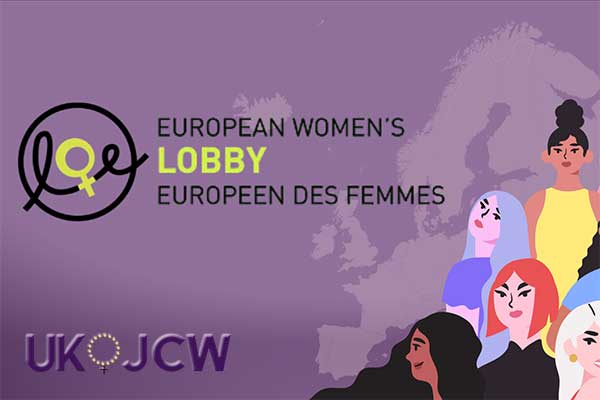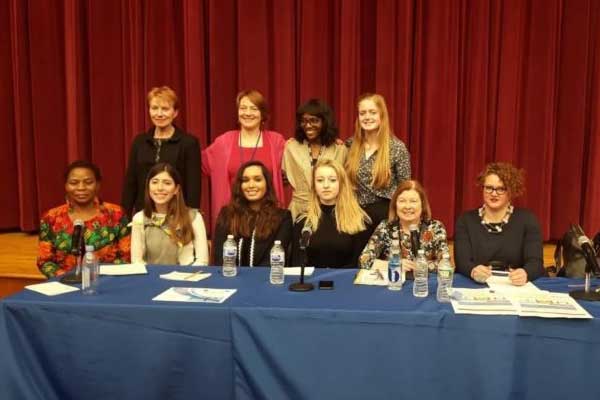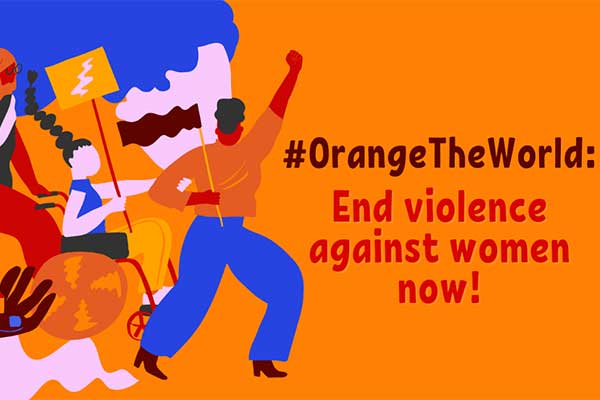Young Women’s Global Voices 2013
There was an intensity in the hush before the first speaker rose to begin. Every chair had an inhabitant and yet they carried on arriving, crowding around doors, sat on tables propped by walls and crouched with steady gaze at the back of the room. It was a delight to see gathered so many youthful faces, fresh and attentive. An interest echoed across generations in the variety of those in attendance. The desire to begin a dialogue about feminism and gender equality that spanned age, experience and background was keenly felt.
The House of Commons seemed a fitting backdrop for the importance and prestige of an event – organised by the National Alliance of Women’s Organisations (NAWO) and the Women’s Federation for World Peace (WFWP) – that intended to excite young women into getting involved in the gender equality agenda on both a national and international scale. More fitting still that it was Heidi Alexander MP for Lewisham East that kicked off the proceedings, speaking with warm officiousness about her political career and life within these walls.
Heidi Alexander MP
Heidi urged us to believe that we can do something to change things, that it is important to ‘put your money where your mouth is’ and ‘throw your hat in the ring’. Highlighting the failure of parliament to sufficiently reflect and represent persons across the UK, it was she quipped: ‘pretty male, pale and stale’. There was laughter at the deft poetic nuance used to illustrate this stark truth. To conclude Heidi asserted that we need women to be present in all spheres of public life and that we must look to ourselves to uncover the skills and interests we can uniquely contribute to this process.
A flying visit from the MP for Ealing Southall sponsoring the event Mr Virendra Sharma, emphasised Heidi’s belief in participation, with Virendra opining that: ‘if you don’t participate you don’t get equality’. He expressed disbelief that there was still a need for equality discussion in the twenty first century, disheartened that equality had not yet been achieved in the political system. A positive upswing was delivered in quiet yet forceful tones through which Virendra spoke of the progress that had been made in encouraging young women to participate in politics, particularly through events like this one taking place in committee rooms in the heart of Westminister, rooms where ‘ordinary people’ were unable to venture mere years before. Virendra’s final hurrah was to assert that this should not be the last meeting on young women’s involvement in the gender equality agenda, an endorsement that was received with a wave of smiles across the room.
Carlene Firmin
Carlene Firmin’s upbeat confidence and engaging style were reflected in the immediate identification within her presentation of the imperative of making yourself heard metaphorically and physically if change is to be implemented that benefits young women. As the founder and director of Girls Against Gangs (GAG) and working in the Office of the Children’s Commissioner Carlene is enthusiastic about providing young women with the support they need to fully realise their identities and their potential within society.
In discussing her career trajectory Carlene admitted that she pursued a degree and work experience in an unrelated sector and that through chance she ended up working at a Children’s Charity. Due to the modest size of the charity Carlene found that she was able to get involved in a wide variety of tasks and that she came to first recognize and then enjoy social policy work. In reflecting on the evolution of her career and specialism’s Carlene candidly expressed that sometimes you must simply: ‘go with what you do at the time and see what happens’. This refreshing honesty was further exampled in Carlene’s belief that it is important as a young woman getting involved in gender equality to say yes to opportunities, be yourself and: ‘use the fact that you are young and talking about things they [e.g. politicians/policy makers and changers] may not have experienced’ to your advantage.
While involved in a youth violence project in which the radio station ‘Choice’ encouraged young people to come and discuss their experiences of violence at a scheduled meeting Carlene noticed that just under 50% of attendees were young women who were deeply affected and concerned by this issue. They outlined fears about carrying weapons for male friends and the constant worry about their brothers being injured or killed. Carlene discovered that girls were not covered in Government policy on gangs at this time though they too were involved in the negative fallout from such groups. It was then that Carlene formed the Girls Against Gangs project in 2010 to: ‘empower girls to become local advisors on gender and youth violence’. In December 2012 £1.2million was pledged by the Government for three year projects funding support workers: ‘for girls vulnerable to or suffering from gang-related sexual violence’ in London, great progress in recognising gender specific violent acts. Carlene built on this positivity by emphatically urging the young women in the crowd: ‘there is a space for you’ and inspiring them to use their unique backgrounds and interests to pursue careers in this sector.
Lucy Barnett of The Orchid Project who work towards: ‘a world free from FGC’ opened her presentation by defining what Female Genital Cutting principally means, explaining that it is: ‘the removal of external sexual organs’. FGC happens for a variety of reasons, including as a right of passage procedure and as a pre-requisite for arranged young marriages. It is supported by communities at large and thus individuals who have misgivings may find it extremely difficult to bring these to wider attention for fear of social exclusion. The Orchid Project recognise that where FGC operates it is a: ‘social norm’ and that all parts of the community facilitate it occurring.
Lucy shocked the event attendees by outlining that 3million women and girls are at risk of FGC ‘in Africa alone’ and that 140million individuals across the world are living with the effects of FGC, thus making this a: ‘real global experience’ that must be tackled as such internationally and nationally. In this vein Lucy talked of The Orchid Project’s global advocacy work which involved talking to leaders from both the UK and other countries, while in the UK additionally focusing on lobbying the Department for International Development (DfID). Lynne Featherstone, International Development Minister unveiled a project earlier this year worth £35million that aims to reduce Female Genital Mutilation (FGM) in 10 key Countries across the world by 30% within 5 years and eradicate FGM within a generation, an example Lucy enthused of deep progress in recognition of tackling FGC.
In Senegal The Orchid Project along with Senegalese rapper and victim of cutting Sister Fa are making a: ‘real’ impact by spreading the message of anti-FGC and empowering women to become ‘agents of change’ within their communities. The popularity of Sister Fa and the method of creating change throughout all elements of communities means that Senegal could be free of FGC within 3years, a staggering achievement.
Lucy concluded that the three important messages to take away from the presentation were: the weight of the numbers of those affected by FGC; that change is happening; and that young women should encourage change and work as advocates for anti-FGC, even in actions as simple as tweeting or facebooking about FGC to break the taboo of discussing it. She finished with the passionate oration that: ‘you can be part of ending it’.
Alex Wilcox
Having travelled to CSW57 this year in March as part of the National Alliance of Women’s Organisations Youth Caucus the next speaker Alex Wilcox felt moved to mount a spirited defence of Feminism and it’s deep relevance to the twenty first century and the lives of young people. It was not ‘just a women’s issue’ and it was a sector in which young people could have an enormous impact: ‘alone we are often ignored, but together we are deafening’. Gender Equality needed to be featured on the UK Curriculum, a suggestion greeted by cheers from the audience, and the focus in schools needed to be shifted from the ‘false illusion’ given by teachers only discussing the progress in women’s rights across the last century on to the imperative for further action.
Mainstream media campaigns around gender equality would be a great way to publicise and generate discussion and a push for change Alex believed, with the Commission on the Status of Women (CSW) and International Women’s Day (IWD) particularly in need of a boost in understanding among young women. Celebrity support and endorsement was additionally a useful tool in spreading feminisms message in relation to the gender equality agenda to newer and wider audiences. Alex encouraged attendees to think creatively, proclaiming: ‘new methods [are needed] for a new generation’ and ‘small amounts add to big things’. Lastly, Alex identified that it was fundamental that young women’s voices were heard and that young women could join women’s organisations to work together for change.
Tom Heathfield, also of NAWO’s Youth Caucus and in attendance at CSW57, provided a novel angle on the gender equality agenda as the only young man speaking on the panel. Tom’s thought provoking and powerful presentation on masculinity and the role of young men in achieving gender equality had a visible impact on the audience as identified in the attentive and furrowed brows of the attendees.
Tom expressed that ideas of masculinity were deeply embedded in our society and centred around a ‘macho stereotype’ of exaggerated aggression. This led men and boys to focus on maintaining a masculine image that included enhancing physique and could turn in to excessively aggressive actions towards women. Due to the intrinsic nature of society and the masculine Tom assessed that it would be impossible to overturn these destructive norms completely thus instead role models within groups of guys should be cultivated and supported who expressed positive change in their behaviour towards women publicly, encouraging other men in the group to do likewise. In this way over time men and women could: ‘build a new model that makes the old model obsolete’.
Additionally Tom urged men to take responsibility for their actions, and for the macho culture in evidence saying: ‘a truly mans man would act independently and be held responsible for their actions’. Tom closed with the reflection that ‘a man’s violent act brings about his own downfall’ as well as inflicting harm on women since the man is ostracised from society for his behaviour, thus working together to establish gender equality benefitted those on all sides of the equation.
Annette Lawson, NAWO’s Chair, closed the event by thanking all those in attendance, eyes gleaming at the progress made in the open discussion of sensitive topics and the enthusiasm of all gathered to get involved and strive for change. The young women at the conference were an exciting example of the new generations impetus to change the situation in which they would become young adults, evidencing a restlessness with the current situation and an open renewal of the relevance of feminism and gender equality. They seemed to suggest that they will not accept anything less than the establishment of gender equality and eradication of violence against women and girls, and they felt united in assuring us that they could do it.
©Rosie Fox 2013
For more information see:
On NAWO and the NAWO Youth Caucus:
www.nawo.org.uk or, http://nawoyouth2013.blogspot.co.uk/
for WFWP Youth Caucus: http://www.wfwp.org.uk/youth/about-us.html
for Heidi Alexander MP: http://www.heidialexander.org.uk/
for Virendra Sharma: http://www.virendrasharma.com/
for Carlene Firmin – Office of the Children’s Commissioner: http://www.childrenscommissioner.gov.uk/
and her articles for the Guardian under ‘Girl in the Corner’: http://www.guardian.co.uk/society/series/girl-in-the-corner
for Lucy Barnett – The Orchid Project: http://orchidproject.org/
For Alex Wilcox and Tom Heathfield: http://nawoyouth2013.blogspot.co.uk/




